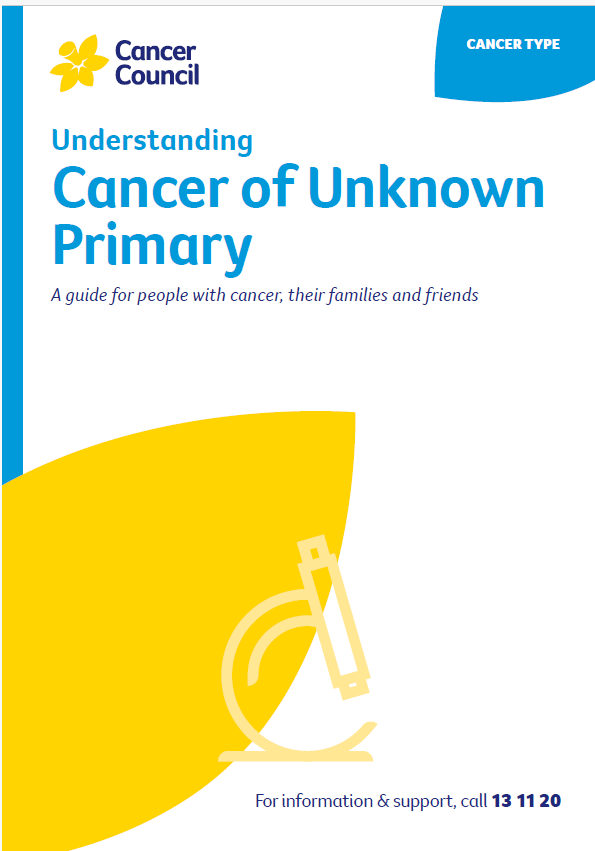Cancer of unknown primary (CUP)
If you’re affected by cancer of unknown primary (CUP), you may have many questions about how it is diagnosed, treatment options, side effects and how to stay well. You can find trustworthy information about all aspects of your experience below.

Print these questions
Diagnosis
- Is there any sign of where the cancer started or what type of cancer it is?
- What tests do you recommend and why? What will they cost?
- What type of specialised tests might be useful?
- Are the latest tests and treatments for CUP available in this hospital?
- Can you explain the results of the tests to me?
- Will a multidisciplinary team be involved in my care?
Treatment
- What happens if you can’t find where the cancer started?
- What treatment do you recommend? What is the aim of the treatment?
- If you find out where the primary cancer is, will my treatment change?
- Are there other treatment choices for me? If not, why not?
- If I don’t have the treatment, what should I expect?
- How long do I have to make a decision?
- I’m thinking of getting a second opinion. Can you recommend anyone?
- How long will treatment take? Will I have to stay in hospital?
- Are there any out-of-pocket expenses not covered by Medicare or my private health cover? Can the cost be reduced if I can’t afford it?
- Are there any clinical trials or research studies I could join?
- Are there any new drugs that might be of help to me?
- Who will be my main point of contact during my treatment?
- Who can help me manage my symptoms and make treatment choices?
- Who can help me plan for my future? Can you tell me about advance care planning?
Side effects
- What are the risks and possible side effects of each treatment?
- Will I have a lot of pain? What will be done about this?
- Should I change my diet or physical activity during or after treatment?
- Are there any complementary therapies that might help me?
Need to talk?
Prof Chris Karapetis, Network Clinical Director (Cancer Services), Southern Adelaide Local Health Network, Head, Department of Medical Oncology, and Director, Clinical Research in Medical Oncology, Flinders Medical Centre and Flinders University, SA (Clinical review); Dr Amey Aurangabadkar, Radiologist, Illawarra Radiology Group, NSW; Clare Brophy, Consumer; Prof Katherine Clark, Clinical Director of Palliative Care, NSLHD Supportive and Palliative Care Network, Northern Sydney Cancer Centre, Royal North Shore Hospital, NSW; Prof Wendy Cooper, Senior Staff Specialist, Tissue Pathology and Diagnostic Oncology, NSW Health Pathology, Royal Prince Alfred Hospital, NSW; A/Prof Richard Gallagher, Head and Neck Surgeon, Director of Cancer Services and Head and Neck Cancer Services, St Vincent’s Health Network, NSW; Dr Chloe Georgiou, Oncology Research Fellow, Australian Rare Cancer Portal, and Oncology Trials Fellow, Bendigo Health Cancer Centre, VIC; Dr Susan Harden, Radiation Oncologist, Peter MacCallum Cancer Centre, VIC; Justin Hargreaves, Medical Oncology Nurse Practitioner, Bendigo Health Cancer Centre, VIC; Dr Laura Kirsten, Principal Clinical Psychologist, Nepean Cancer Care Centre, NSW; Prof Linda Mileshkin, Medical Oncologist, Peter MacCallum Cancer Centre, VIC; Caitriona Nienaber, 13 11 20 Consultant, Cancer Council WA.
View the Cancer Council NSW editorial policy.